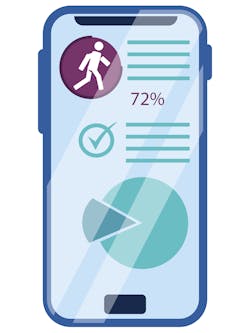Responding to the COVID-19 emergency, a group of clinical informatics experts from across the country has come together to stand up a platform for what they call “participant-centered, rapidly deployed, digitally enabled research.” Within only a few weeks of its conception, Rush University Medical Center began enrolling COVID-19 patients in its registry and other academic medical centers are getting on board.
The INSPIRE (Innovative Support for Patients with SARS-COV-2 Infections Registry) project has a goal of working in near real time to generate knowledge to combat the global pandemic.
In January 2017 I wrote about the work of Harlan Krumholz, M.D., the director of the Center for Outcomes Research and Evaluation at Yale-New Haven Hospital in Connecticut, who argued that putting the patients in control of their data and making it easier for them to participate in research has the potential to disrupt traditional models of research, which can take years to complete and cost lots of money.
Krumholz also worked to develop a platform (and company) called Hugo Health to enable patients to access their EHR data via API and synchronize it with a research database to better facilitate participation in research studies. Now he is one of the leaders of this project and Hugo is the platform being used. Besides just getting their EHR data, after discharge the project will prompt them to add data from other sources and describe their current state with patient-reported outcome measures. “We believe we will have richer information than just mining EHRs,” Krumholz said.
Speaking during the April 3 meeting of the NIH Collaboratory Grand Rounds, Krumholz said that the goal is for the health system to get smarter every day through experience, and then feed that knowledge back to the front-line clinicians, labs and groups making tools. “The country is in a dire situation. We need actionable information as fast as we can get it, and we need as many smart people as possible to be working on it with open science principles,” he said. “We want to develop a means to accumulate data and feed it back to where it needs to go.” The initial focus is on risk stratification of patients to better understand how to predict who is at risk and who is not, but the platform could also be used for other types of clinical research, he said. Among the properties he listed that such a platform must have:
• Standards-based
• Rapidly deployed
• Participant-centric
• Low burden on clinical teams
• Private and secure
The prototype for the project is at Rush University Medical Center in Chicago. Bala Hota, M.D., M.P.H. the chief analytics officer there, first described its experience with COVIE-19. “We are going through a rapid increase of COVID-19,” he said. On March 2 the hospital set up its first incident command system and on March 4 had its first COVID-positive patient.
Realizing that they had to be agile and respond to new information, they soon set up a research command center and submitted to Rush’s IRB an approval request for a registry protocol. By March 13 it was approved. “This patient-focused research approach allowed us to be approved faster,” Hota said. They also built a biorepository protocol that was approved by March 19. By March 23 they were seeing exponential growth in the number of cases, with a doubling time of 2.2. days. The hospital began building new ICU units. “We were also beginning to see the volume of cases needed for our enrollment strategy. So it was less than a month from first thinking of the registry to enrollment.
As of April 3, Rush had seen 466 COVID-19-positive patients; 111 were admitted; 52 were in the ICU and 33 on ventilators.
In the COVID era, the patient recruitment is being done telephonically, Hota explained. “We are finding it is a pretty frictionless experience. We can text them a link to a page they go to with instructions to download an app. They do consent in the Hugo app. Then a connector allows the electronic download of their data into Hugo and then they can release whatever data they choose into the study.” Both inpatients and outpatients have been receptive to participating, he added.
He said a big help has been the work done of interoperability at the federal level and even Apple’s Health Kit, allowing data to flow to a mobile device and then connect to a registry. “We are optimistic we can scale beyond what we are doing now.”
Researchers at the University of Washington also are participating. Graham Nichol, M.D., M.P.H., a professor of emergency medicine at UW, noted that other registry projects have sprung up to study COVID-19, including an international intubation-based registry. “We are trying to extend the work at Rush to capture not just hospitalized patients but also patients at the point of testing. We also have IRB approval and will begin enrollment next week.” (Yale-New Haven Hospital expects IRB approval to participate soon.) “We will accumulate a large number of patients tested for COVID and follow them,” Nichol said, “to be able to rapidly and precisely answer clinically relevant questions.”


